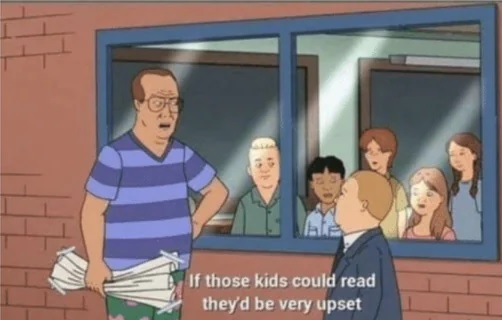Question above is pretty blunt but was doing a study for a college course and came across that stat. How is that possible? My high school sucked but I was well equipped even with that sub standard level of education for college. Obviously income is a thing but to think 1 out of 5 American adults is categorized as illiterate is…astounding. Now poor media literacy I get, but not this. Edit: this was from a department of education report from 2022. Just incase people are curious where that comes from. It does also specify as literate in English so maybe not as grim as I thought.
If you don’t understand, start walking further away from the cities.
If you still don’t understand, you’re not done walking.
If you think the problem is in the countryside, you’ve never been to New York City, and particularly the Bronx.
I grew up in New York city, and lived in the Bronx. Most of the people living there are literate in their mother tongue, less so in English. Is that what you were trying to say?
No. What I meant to say is that native English speakers in the Bronx have poor literacy rates.
https://www.norwoodnews.org/bronx-barriers-literacy-challenge/
Right?
Walk far enough into certain cities and you’ll see the same problem. It’s very closely tied to socio-economic class and a self perpetuating problem.
There’s a slight gradient in literacy when looking at grade level but it’s not really accurate with illiteracy. Seems cities can still have a considerable population that can’t read.
Home schoolers/child abusers are everywhere.
Note: Not talking about legitimate, regular curriculum, “online school” for kids that can’t attend normal school for whatever reason, (e.g. bullying, immunocompromised, etc). I’m referring to religious/cult garbage home schooling stuff that doesn’t teach kids much of anything. Parents that put girls through these programs often end them at the fifth or sixth grade (because that’s all they need to be “good wives”).
To add to this, I think people often underestimate how “easy” it can be to function in society without being able to read well. I know that some folks who either don’t read at all or read at a very low level have just gotten used to interpreting the world around them without the language part. For example, visually recognizing a username and password field on a website and knowing what they’re for, or recognizing the symbols and colors used for certain objects or meanings, all without the actual words needing to mean anything to them for them to understand what it is and what to do with it. And for those who can read at a 5th or 4th grade level (and would thus be included in the stat mentioned in this post), they’re likely then very capable of reading and understanding the majority of text they’re going to come across in their day-to-day lives.
Of course, I don’t want this to sound like I’m saying being illiterate is easy, I’m sure it creates MANY barriers and difficulties for the person, but I do think humans are also flexible and resilient, and are able to survive using other cues.
Probably a combination of flat out retards and recent immigrants for whom English is a second language.
Dear sir or madam,
You are a poopy face.
Warmest regards,
Dodgy_bagel

Thanks!
Because the government, federal and state level (especially conservative) hate public education and fight to defund it as much as possible. Largely because an educated populace is a dangerous populace. Especially when your political platform relies on identity politics, culture wars, cheating, screwing over the poor, opposing minorities, religious fundamentalism, and any other regressive, oppressive bullshit you can think of. They want stupid voters that they can point at “the enemy” and pit against each other to distract them from facts, all so they can stay rich and powerful.
It’s because a lot of conservatives believe in a really screwed up, masochistic, bastardized version of Christianity that prioritizes vengeance, punishment, and anger. It ignores the love, kindness, acceptance, and mercy (ie the actual teachings of Jesus) that make society work well.
So, when kids come home with these new ideas about kindness and acceptance, because being kind to a gay classmate is a great way to demonstrate the love real Christianity teaches and society values, the parents freak out. They push to ban books, fire teachers, and move their kids to private schools that more match their hate filled, divisive worldview. Education polluted their child with abnormal, liberal indoctrination, like being kind, empathetic, and accepting of others.
I an attempt to steer their children back to their core values of hate and divisiveness, they lash out. Any pushback the parents feel in response becomes persecution, because of course “the world” would disagree with them. They’re the TRUE Christians afterall. So they isolate in ecochambers, and they get more hateful. Any difference of opinion is met with derision and just simply validates their position. And despite being the TRUE Christians, or REAL conservatives, they become less Christian and less conservative every day, instead just becoming these weird, evil, empty husks of people with no real values or ideals outside of hate.
So I am a researcher by trade in this field, got a PhD, and develop these kinds of stats (at a more local level). I also have taught basic adult literacy for about 15 years. I think the poster was likely referring to an NCES stat.
We tend to think of adults with low English literacy as people who dropped out of school or never went. We also tend to think “illiterate” is binary, you can read or you can’t. But the definition is based around grade-level reading (what can you identify and synthesize from standardized text in English in a given time frame) and inclusive of a broader population. We’re talking about people who can’t pick up a copy of USA today and tell you the main idea of a front-page article. They can drive, they can work, etc. So they get along and this issue get ignored.
For example, some stats on illiteracy will count “non-participants” among those who can’t read/write, but this includes people in the study with cognitive disabilities or language barriers to the point that they can’t take the reading test. The share of U.S. adults who are functionally illiterate in English includes some non-native English speaking adults and also a couple generations of folks with reading diasbilities who passed through school, AND people who didn’t read for myriad other reasons.
I have tutored older adults learning to read/write for many years and have met a lot of people who ran businesses or raised families or worked full careers before learning to read. Adaptable and clever bunch. And even many U.S.-born native English speakers who got shuffled through high school despite serious disadvantage and/or disabilities.
people who can’t pick up a copy of USA today and tell you the main idea of a front-page article
Thanks! Suddenly America makes a lot of sense now.
the definition is based around grade-level reading (what can you identify and synthesize from standardized text in English in a given time frame) and inclusive of a broader population. We’re talking about people who can’t pick up a copy of USA today and tell you the main idea of a front-page article.
Purely anecdotal, but I know someone who is a tenured professor at a university that will flat out refuse to answer any question that has too much supporting detail around it. As in, if you say “for this part of the assignment, I’m doing…” and proceed to describe your attempt at problem solving over four or five sentences, asking if what you’ve done is correct or close to it, and he will simply respond with “there’s too much here to unpack, sorry,” and refuse to answer the question. But if you do it in person, like verbally read out the same paragraph you wrote, he can understand and answer it. There’s other things, too. He can type out simple sentences, but has a very poor grasp of spelling, frequently getting very simple words wrong (think different versions of there, their, and they’re). It’s genuinely baffling how he got to that point, but he also hasn’t ever really published material and it kinda makes sense why. Dude has a doctorate in a STEM field and I think the reason for that is that he can understand mathematics, but literally can’t understand complex writing. Any idea that takes more than a single sentence to explicate just evaporates out of his head.
I’ve never seen anything as extreme as you describe, but when I took the GRE I met a guy kind of like this. After you finish the exam it gives you an estimate of your score, but your real scores are sent to you weeks later. On the way out some guy asked me how I did (fairly well but not 97% plus on anything). He was like “oh damn if you don’t get above 95% on math then you can’t go to grad school in STEM lol”. I asked him what he got in the reading and writing and he said <33% “but that isn’t important for grad school” lmao
Very interesting read! I’m from Germany and taught myself English. I’m currently at a C1/B2 level (it’s a European standard I think?) and consider myself good enough to move through English speaking countries independently just fine.
I’m basically studying English every day by reading and watching YouTube exclusively in English. Love it!
It’s a shame that many people don’t bother honing their language skills.
That’s really impressive, I do wish I took learning another language more seriously when I was younger. Everyonce Ina while I try to dig back into it but lose motivation for one reason or another.
What did you find to be the most helpful starting out?
deleted by creator
Thanks for the pointers! For context, English is my only language, but the premise applied to other languages is the same, so thanks!
Unironically relevant

My girlfriend is a math teacher, the number of middle schoolers that can’t do basic multiplication before is surprisingly high. Yet the schools keep passing the kids. I remember learning multiplication as a 4th grader, if I hadn’t, I would’ve never passed.
My niece from Florida came to live with me in December, just finished fifth grade and I was stunned that she doesn’t know her multiplication tables. My kids In Pennsylvania learned them in 3rd grade a few years ago.
Does she understand the concept of multiplication though? That’s ultimately the important part.
Learning rote things like multiplication tables seems kinda silly in a world where Google can just do the math for you. But the important thing is to be able to recognize when multiplication is useful.
There are still plenty of instances where doing arithmetic quickly in your head is useful (figuring out a tip at the cash register, for example) that memorizing it can have advantages.
I’m not an expert, but I have to imagine it’s in relation to the fact that public education in the United States tends to be rather underfunded. Teachers often don’t have all the resources to do their jobs effectively, and many resort to paying for resources out of their own pocket.
Pair that with the fact that the average salary for a teacher in a public school is almost criminally low for a position that has a massive impact on our social outcomes, and you get students that are disengaged and overall not as prepared as they could be.
This is all just what I’ve gathered from reading news articles over time. I’m sure there are several other factors at play.
It has far more to do with parents than teachers for basic literacy. If a family/child doesn’t read at home, the child will never get enough practice to achieve a high level of comprehension.
My grade 5 child already reads at a grade 9 of 10 level, but we read together every night and have done so for the last decade of his life. His room has more books than toys.
His average schoolmate has an Xbox in their room instead of books. He complains about it all the time. The electronic device in his room is his kindle.
Cuba didn’t achieve 98% literacy by having a country of concerned parents. They had a massive education push with basically unlimited support from the government.
Placing the responsibility of America’s failure to educate its populace on individuals is honestly kind of insidious. America needs to dedicate resources to education. Period. Their failure to do so is why so many Americans are dumber than stumps.
As a school psychologist who completes academic assessments when identifying students with learning disabilities, COVID skyrocketed these numbers. There’s just not a lot of motivation for kids anymore. The future is here and is making our population slowly illiterate.
The weird part is because a lot of people don’t know what illiterate means…
They think these people can’t read a fast food menu and words just look like chicken scratch.
The definition of illiterate is “unable to read or write.”
That pretty much sounds like what you just said. What do you think it means?
There isn’t much nuance in the definition.
There are a lot of factors. The biggest one is they want people stupid. Stupid people are much easier to control.











